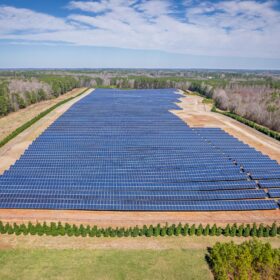Recycling solar panels: Making the numbers work
NREL researchers said a profitable and sustainable solar panel recycling industry could establish itself by 2032. Here’s how the numbers work.
Tracking the Sun report offers insight into distributed solar trends
The annual report found that residential system sizes continued to grow even as installed prices declined at a slower pace. Battery attachment rates are growing, but remained below 10% in 2020.
FTC touts tracker capable of withstanding 120 MPH winds
The Voyager+ can withstand category 3 hurricane winds and also tackles the challenges of low wind speeds that have historically been an issue for 2P trackers.
Solar Futures Study offers a roadmap for solar to decarbonize the grid
The NREL-led study said that by 2035 the U.S. would need to quadruple its yearly solar capacity additions and provide 40% of the electricity on the grid, on the order of 1,000 GW.
Study outlines how 18 GW of solar can be deployed in the Carolinas by 2030
Tripling the amount of solar to be added in the Carolinas compared to Duke Energy’s plans would yield cost savings, a Brattle Group study found.
Sunrise brief: Revised rules could make it easier to use public lands for solar
Also on the rise: LG will supply RWE with 200 MW of storage, SB Energy signs a PPA for a Texas solar project, and Invenergy lines up financing for a 200 MW Michigan solar project.
Measuring impacts on solar performance, whatever the weather
Researchers at Sandia National Laboratories used machine learning to analyze maintenance reports, performance data, and weather records from more than 800 solar farms located across the country.
DOE grants aim to drive down inverter costs, advance PV fire prevention tech
Several of the projects also aim for lower costs for PV module materials or PV racking, as well as for lower defect rates on module assembly lines.
Sunrise brief: Want solar with that? McDonald’s signs up for a Louisiana project
Also on the rise: Illinois’ solar residential market fell off the roof in Q2, Arizona approves incentives for residential energy storage, and green roofs can improve panel efficiency.
Green roofs can boost solar panel efficiency, study finds
The improvements are believed to stem from lower temperatures on the green roof.














